- Home
- Patrick O'Brian
The Fortune of War Page 4
The Fortune of War Read online
Page 4
'You did not read them through, I collect?'
'Not quite through, or I should have smoked it, you know. I am not such a flat as all that.'
'Listen, Jack,' said Stephen, 'if you brood upon it now, without all the data or learned advice, you will do no good, and you will make yourself sick. I know your constitution: who better? It is not one that can withstand prolonged, and above all useless, brooding. You must discipline your mind, my dear. For you are to consider, that thanks to this blessed order, you will be home sooner than the swiftest messenger—you are yourself the swiftest messenger—and that therefore it is your present duty to be reasonably gay, or at least to affect the motions of gaiety. You are to indulge in field-sports, such as the game this afternoon, until La Flèche comes in. Be not idle; be not alone. I speak in all gravity, brother, as a physician.'
'I am sure you are right, Stephen. Moping and cursing don't answer: I shall spring about on shore until La Flèche is on the wing. By rights I ought to sit mewed up with the ship's books, to pass my accounts—muster-book, slop-book, sick-book, gunner's, bosun's, and carpenter's returns, general and quarterly accounts of provisions, order-book, letter-book, and all the rest. But they went overboard: everything but the log and my remarks and a few others, that I took up to the Admiral. So I can play with a clear conscience, at least. Though I tell you what, Stephen, La Flèche can't come in too soon for me, though I dearly love a game of cricket. If it had not been that we are already ordered home, I should apply for leave, or invalid, or even throw up the service to be back.' He considered for a while, looking very grim; and then, with an obvious effort at disciplining his mind, he said, 'Is that your bat, Stephen?'
'It is I have just roughed it out with the carpenter, and am about to work upon the distal extremity with a bone-rasp, to deepen the recess.'
'It is rather like my grandfather's bat at home,' said Jack, taking it in his hand, 'curling out sideways at the end like that. Don't you find it a trifle light, Stephen?'
'I do not. It is the heaviest hurly that ever yet was cut from the deadly upas-tree.'
The match began precisely on the hour, by Admiral Drury's watch: Jack won the toss, and elected to go in. The game was democratic, to be sure; but democracy was not anarchy; certain decencies were to be preserved; and the Captain of the Leopard, with his first lieutenant, led the way, while the Admiral opened the proceedings, bowling downhill to Babbington. He took the ball from his chaplain and polished it for a while, fixing the lieutenant with a steely glare; then, taking a skip, he bowled a wicked lob. It pitched well up outside the off stump, and Babbington played back; but as he played, so the ball broke in towards his vitals, and jerking back further still he spooned the ball neatly into the Admiral's hands, to a roar of applause from the assembled Cumberlands.
'How is that?' said the Admiral to the chaplain.
'Very pretty, sir,' said the chaplain. 'That is to say, Out.'
Babbington returned, downcast. 'You want to watch the Admiral,' he said to Captain Moore, of the Leopard's Marines, who succeeded him. 'It was the most devilish twister you ever saw.'
'I shall play safe for the first hour or so, and wear him out,' said Moore.
'You want to dart forwards and catch 'em full-toss, sir,' said Doudle. 'That's the only way to knock him off his length—that's the only way to play them lobs.'
Some Leopards agreed; others felt that it was preferable to bide one's time, to get used to the feel of the wicket, before setting about the bowling; and Captain Moore walked off with a wealth of contradictory advice pursuing him.
Having never watched a cricket-match before, Stephen would have liked to see what course Moore pursued, and what indeed the game consisted of—it obviously differed in many respects from the hurling of his youth. He would also have liked to go on lying on the grass in the shade of the majestic camphor-tree, gazing at the brilliantly-lit expanse of green with the white figures arranged upon it in the pattern of a formal dance or perhaps of a religious ceremony—perhaps of the two combined—a resplendent field surrounded by a ring of figures, some all in white, some with blue jackets, some with brilliant sarongs; for the Cumberlands had already supplanted the Dutch soldiers in the affections of the local fair. But at this moment a messenger appeared with a note: Mr Wallis was truly grieved to importune Dr Maturin, but his confidential clerk had fallen sick; there was a most important despatch to be enciphered before the arrival of La Flèche; and if his dear Maturin were at leisure, Mr Wallis would be infinitely grateful for a hand.
'I am not quite at liberty, colleague,' said Stephen, reaching the dirty little office. 'My ship is engaged in a match of cricket, and I am to take my part. However, Captain Moore stated that he should play safe for an hour or so; though for the life of me, I cannot conceive how he can spend . . . Never mind: let you read it out en clair and I will cipher. You are using thirty-six with the double shift, I take it?'
Slowly the despatch rolled out; in a dull, toneless, uninterested voice it related the devious proceedings of Mynheer van Buren at the court of the Sultan of Tanjong Puding, the surprising steps that Mr Wallis had taken to counteract them—Stephen had never known that Wallis was quite such a man of blood, nor that he had such enormous sums at his disposal—concluding with an objective statement of the case for and against a British occupation of Java, from the political point of view. 'The ethics they may sort out for themselves,' said Wallis. 'That is not my concern. What do you say to a glass of negus?'
'With all my heart,' said Stephen. 'Thirty-six, with the double shift, is dry work.' But he was fated never to drink his negus.
'Sir, sir,' cried a scarlet young gentleman from the Leopard—an absurdly beautiful child called Forshaw who had always been very kind and protective towards Dr Maturin—'I have found you at last. You are in! Doudle is out—you are in—and we are all at a stand—the Admiral told me to run—I ran to the hospital, and I ran to Madame Titine's—nine wickets down and we have only notched up forty-six—we are in a terrible way, sir, terrible.'
'Calm yourself, Mr Forshaw,' said Stephen. 'It is but a game. Forgive me, Wallis; this is the engagement of which I spoke.'
'How grown men can think of playing bat and ball in this weather,' said Wallis to the closing door, as he drank Stephen's negus, 'I cannot tell.'
'Oh pray, sir, come on,' cried Forshaw over his shoulder. 'The Admiral is skipping up and down: and we are in a dreadful way. Mind the branch, sir. Nine wickets down, and only forty-six. Mr Byron got a duck, and so did old Holles.'
'How came you to think I should be at Madame Titine's, Mr Forshaw?' asked Stephen. 'And you are never to go there yourself, either.'
'Oh pray do come on, sir,' cried the child again, dodging behind Stephen to urge him to a run. 'Let me carry your bat. We absolutely depend on you. You are our only hope.'
'Well, I shall do my best, sure,' said Stephen. 'Tell me, Mr Forshaw, the aim is to beat down the opposing wicket, is it not?'
'Of course it is, sir. Oh pray come on. All you have to do is to keep your end up and let the Captain do the rest. He's still in, and there's still hope, if only you will keep your end up.'
They emerged from the tropical vegetation, greeted by a general cheer. Stephen advanced, carrying his hurly: he was feeling particularly well and fit; he had his land-legs again, and no longer stumped along, but walked with an elastic step. Jack came to meet him, and said in a low voice, 'Just keep your end up, Stephen, until your eye is in; and watch out for the Admiral's twisters,' and then, as they neared the Admiral, 'Sir, allow me to name my particular friend Dr Maturin, surgeon of the Leopard.'
'How d'ye do, Doctor?' said the Admiral.
'I must beg your pardon, sir, for my late appearance: I was called away on—'
'No ceremony, Doctor, I beg,' said the Admiral, smiling: the Leopard's hundred pounds were practically in his pocket, and this man of theirs did not look very dangerous. 'Shall we begin?'
'By all means,' said Stephen.
'You
go down to the other end,' murmured Jack, a chill coming over him in spite of the torrid sun.
'Should you like to be given a middle, sir?' called the umpire, when Stephen had walked down the pitch.
'Thank you, sir,' said Stephen, hitching at his waistband and gazing round the field, 'I already have one.'
A rapacious grin ran round the Cumberlands: they moved much closer in, crouching, their huge crab-like hands spread wide. The Admiral held the ball to his nose for a long moment, fixing his adversary, and then delivered a lob that hummed as it flew. Stephen watched its course, danced out to take it as it touched the ground, checked its bounce, dribbled the ball towards the astonished coverpoint and running still he scooped it into the hollow of his hurly, raced on with twinkling steps to mid-off, there checked his run admist the stark silent amazement, flicked the ball into his hand, tossed it high, and with a screech drove it straight at Jack's wicket, shattering the near stump and sending its upper half in a long, graceful trajectory that reached the ground just as the first of La Flèche's guns, saluting the flag, echoed across the field.
Chapter Two
'The boat ahoy?' roared the Leopard's Marine sentry, meaning 'What boat is that? Whom does it convey?'
The question was unnecessary, since La Flèche lay not a cable's length to windward, and all the Leopards with time to look over the side had seen her captain get into his gig in reply to the Admiral's signal, pull ashore in splendour, return an hour later with an official package, certainly despatches, go aboard on the larboard side of his ship, silently reappear with a parcel of quite a different shape, and pull straight for the Leopard. A question unnecessary for information, but nevertheless of great importance, since nothing but the coxswain's answering roar of 'La Flèche' could set the proper ceremony in train.
The performers were pitifully shabby, the ship herself devoid of paint, but the rite was carried out in every detail, side-boys as brown as Malays and almost as bare darting down to offer the man-ropes with hands ludicrously gleaming in white gloves, run up by the sailmaker, the bosun's call wailing as he and his mates piped the side, the rugged Marines presenting their bright arms as Captain Yorke set foot aboard and saluted the quarterdeck. Byron, the officer of the watch and therefore as respectable as his means would allow, received him, and a moment later Jack Aubrey, having had time to clear the cabin of wombats and to put on a pair of whole trousers, emerged from his cabin. 'Yorke!' he cried. 'Welcome aboard. I am delighted to see you.'
They shook hands, and Jack introduced his officers, Babbington, Moore, and Byron, and those of his midshipmen who were at hand, while all the time Captain Yorke studiously avoided seeing the Leopard's squalor, and then led him aft. As soon as the cabin door closed behind them Yorke said, 'I have a letter for you, Aubrey,'—pulling it from his pocket—'I took the liberty of waiting on Mrs Aubrey on my way down to Portsmouth, thinking that just in case the Leopard had—that is to say, had reached the East Indies, you might like news of her.'
'What a good fellow you are, Yorke, upon my soul,' cried Jack, growing suddenly red with delight. He took the letter and stared at it with his bright blue eye. 'You could not have given me greater pleasure, short of bringing her out to me yourself. Amazingly good-natured in you: I take it very, very kindly. How was she? How did you find her? How did she seem to be going along?'
'Most uncommonly well, I do assure you. Overflowing spirits; came downstairs singing; I have never seen her look so well. She had a bran-new baby in her arms, and kept laughing at it for being so perfectly toothless and bald.'
'Oh,' said Jack.
'A new nephew or niece of yours; I forget quite which. I had put on a pretty solemn face, I can tell you, what with that ugly tale of the boats, and with Leopard being so damnably overdue; so I was taken aback to find her brimming over with spirits—even more so when she laughed and said she would be obliged to me if I would bring you out some warm stockings. Indeed, I was so put about, that I could hardly follow her explanation; but it seems she had had a letter from America to say that all was well. I forget the details, though she showed me the letter—she had it in her bosom. Not that she had needed it, she said; she had always known perfectly well you were safe. But she was infinitely obliged to the sender, and the moment she received it she had set to work on a new set of active-service linen and some more stockings: she had not needed the letter, however.'
'It must have been the American brig that put into Desolation Island, when we were trying to put ourselves to rights,' said Jack, laughing for joy. 'Honest, good-hearted fellows; though you would not think so to look at them. Ha, ha, ha! Bless 'em. There is good in everybody, Yorke, even an American.'
'Certainly there is,' said Yorke. 'I have half a dozen in La Flèche at this moment, and prime seamen they are, every man-jack of them. I pressed them out of a Salem barque, a little south of Madeira. They cut up rough at the time, but they soon made the best of it. Capital fellows.'
'You did not see the children, I suppose?' said Jack.
'No. But I heard them. They were singing the Old Hundredth.'
'Bless 'em,' said Jack again, and he cocked his head. 'That must be my surgeon coming aboard. You will like him; a reading man too, most amazing learned; a full-blown physician into the bargain, and my particular friend. But I must tell you this, Yorke; he is wealthy—' In point of fact Captain Aubrey had little idea of his surgeon's fortune, apart from knowing that he owned a good deal of hilly land in Catalonia with a tumbledown castle on it. But Stephen had done pretty well out of the Mauritius campaign; his manner of living was Spartan—one suit of clothes every five years and perhaps a couple of shirts—and apart from books he had no visible expenses at all. Jack was no Macchiavel, but he did know that to the rich 'it should be given; that capital possessed a mystical significance; that even the most perfectly disinterested respected it and its owner; and that although a naval surgeon was ordinarily a person of no great consequence, the same man moved into quite a different category the moment he was endowed with comfortable private means. In short, that whereas an ordinary surgeon, living on his pay, might not readily be indulged in room for exotic livestock, an imperfectly-preserved giant squid, and several tons of natural specimens, in a stranger's ship, a wealthy natural philosopher might meet with more consideration; and Jack knew how Stephen prized the collection he had made during their arduous voyage. '—he is wealthy, and he only comes with me because of the opportunities for natural philosophy; though he is a first-rate surgeon too, and we are very lucky to have him. But this voyage the opportunities have been prodigious, and he has turned the Leopard into a down-right Ark. Most of the Desolation creatures are stuffed or pickled but there are some from New Holland that skip and bound about: I hope you are not too crowded in La Flèche?'
'Not at all,' said Yorke. 'We brought out a quantity of soldiers and their stores for Ceylon, and now there is plenty of room. Plenty, that is to say, for a twenty-gun post-ship.'
'So that is a twenty-gun post-ship,' said Stephen Maturin to Babbington, as they stood by the rail, looking out over the sea at La Flèche: she was unusually beautiful in her pure lines, unbroken by quarterdeck or forecastle—a flush-decked ship—and her strongly-raked masts gave her a dashing air. She had recently been repainted with a blue streak, slightly darker than the perfect sea, up to her ports, then a band of white with the black port-lids dividing it, and then a lighter blue, while discreet gold twinkled with the ripple at her head and stern. She had been titivated off to the nines for the Admiral's inspection, scrubbed by the lifts and braces, sails furled in a body with never a wrinkle; and as she lay there, framed by the wooded Kampong headland a mile or so beyond her starboard bow and a low sandy island with a few palm-trees far on her quarter, she might have been something without weight or earthly substance, ideal, self-existing, belonging to another dimension. 'Ten port-holes I see on this side,' he went on, 'and no doubt there are ten more on the other, which makes the same number of guns as she is alleged to carry, for onc
e. But as for the post, I cannot make it out at all, unless it is that odd slender pole at the back.'
'No, sir,' said Babbington. 'That is the ensign-staff, I believe. We all have them, you know. No: they call her a post-ship because she is commanded by a post-captain—I mean she is a sixth-rate, the smallest ship a man can be posted into, you follow me?'
'Imperfectly. She has a curious touching beauty of her own, however. But tell me, Mr Babbington, is she not very small?'
'Why, I should imagine she would gauge about four hundred and fifty ton to our thousand or so. I dare say you are thinking about your collection, sir?'
'I am, too. Yet perhaps there are not many people in her—perhaps room can be found. The sea-elephants can be unstuffed and folded up.'
'Her complement would be a hundred and fifty-five, including the boys. And then of course there are all of us, the passengers.'
'Oh dear, oh dear,' said Stephen in a low voice, and he was about to suggest that the Leopard's midshipmen would be far better off running about in the sun and fresh air of the East Indies than moping themselves into a phthisis in an overcrowded berth when Babbington left him at a run. Captain Yorke was leaving the ship, the usual compliments attending him: stepping into his gig he called up. 'At the turn of the tide, then? She should cast pretty, at the turn of the tide; and I should not like to lose a moment of this monsoon.'
'At the turn of the tide,' answered Jack, looking at his watch. And then turning to Stephen he said, 'Captain Yorke is very handsomely clearing his whole forepeak for you, and all your dunnage must be aboard within the hour. Mr Babbington will give you a party to rouse it out, and you must supervise its stowage. La Flèche's boats will be alongside as soon as I am relieved. There is not a moment to be lost.'
Stephen was used to the shocking abruptness, the inhuman promptitude of naval decisions—the cry of 'Lose not a minute' had echoed in his ears from his first day in the service—but never had he been expected to be required to transfer the fruit of so many months of patient toil from one ship to another in fifty-three minutes. The minerals alone weighed several tons. His mouth opened in protest but he knew that there was no hope, closed it again, and stared distractedly around.

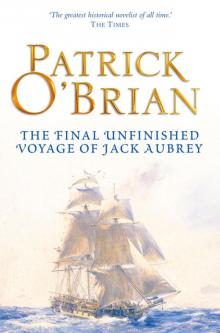 The Final Unfinished Voyage of Jack Aubrey
The Final Unfinished Voyage of Jack Aubrey The Rendezvous and Other Stories
The Rendezvous and Other Stories Caesar: The Life Story of a Panda-Leopard
Caesar: The Life Story of a Panda-Leopard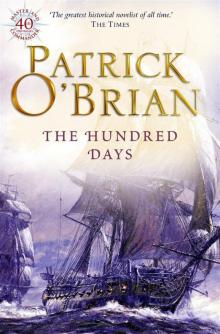 The Hundred Days
The Hundred Days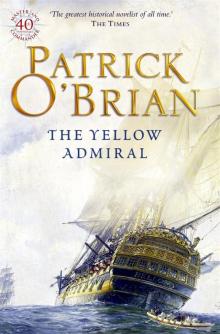 The Yellow Admiral
The Yellow Admiral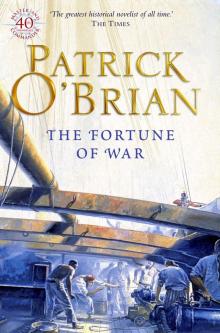 The Fortune of War
The Fortune of War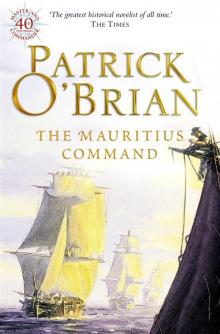 The Mauritius Command
The Mauritius Command Beasts Royal: Twelve Tales of Adventure
Beasts Royal: Twelve Tales of Adventure A Book of Voyages
A Book of Voyages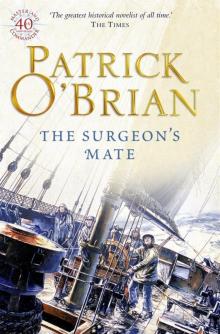 The Surgeon's Mate
The Surgeon's Mate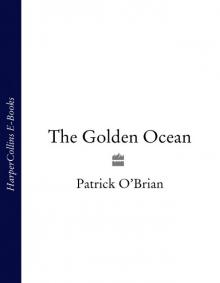 The Golden Ocean
The Golden Ocean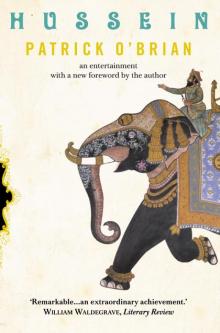 Hussein: An Entertainment
Hussein: An Entertainment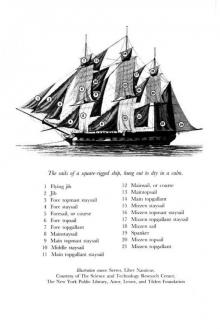 H.M.S. Surprise
H.M.S. Surprise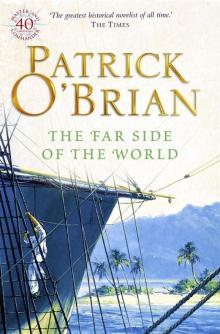 The Far Side of the World
The Far Side of the World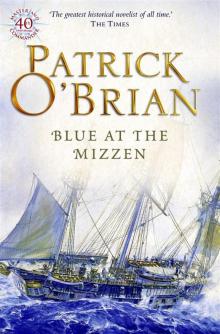 Blue at the Mizzen
Blue at the Mizzen The Unknown Shore
The Unknown Shore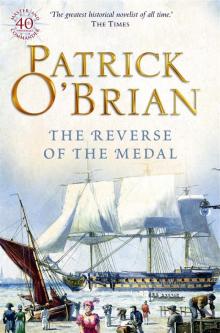 The Reverse of the Medal
The Reverse of the Medal Testimonies
Testimonies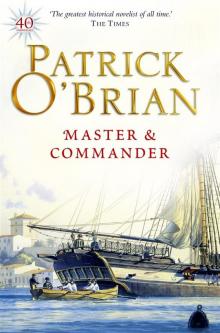 Master and Commander
Master and Commander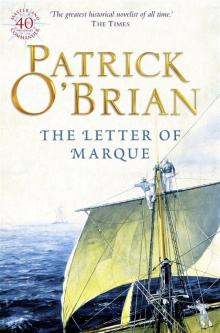 The Letter of Marque
The Letter of Marque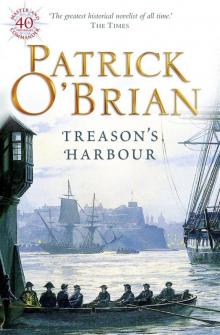 Treason's Harbour
Treason's Harbour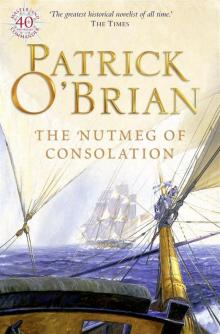 The Nutmeg of Consolation
The Nutmeg of Consolation 21: The Final Unfinished Voyage of Jack Aubrey
21: The Final Unfinished Voyage of Jack Aubrey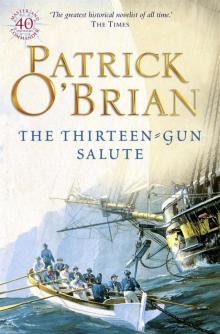 The Thirteen-Gun Salute
The Thirteen-Gun Salute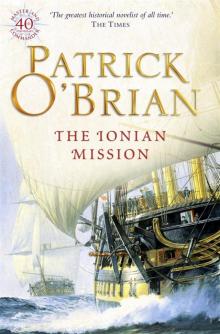 The Ionian Mission
The Ionian Mission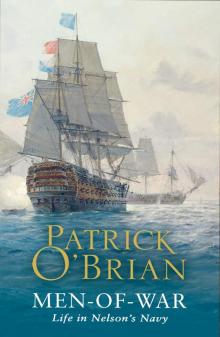 Men-of-War
Men-of-War The Commodore
The Commodore The Catalans
The Catalans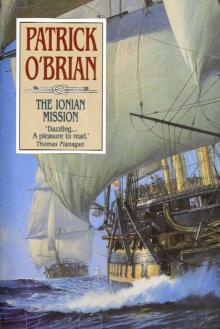 Aub-Mat 08 - The Ionian Mission
Aub-Mat 08 - The Ionian Mission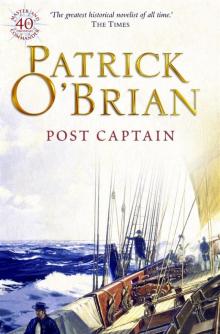 Post Captain
Post Captain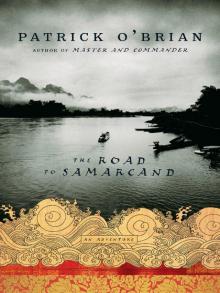 The Road to Samarcand
The Road to Samarcand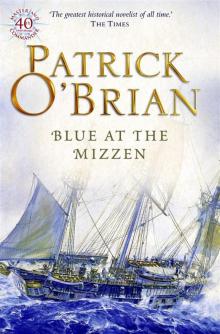 Book 20 - Blue At The Mizzen
Book 20 - Blue At The Mizzen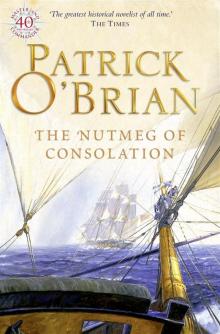 Book 14 - The Nutmeg Of Consolation
Book 14 - The Nutmeg Of Consolation Caesar
Caesar The Wine-Dark Sea
The Wine-Dark Sea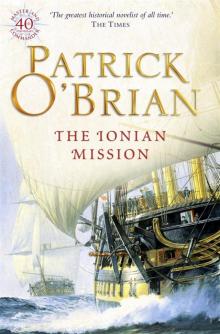 Book 8 - The Ionian Mission
Book 8 - The Ionian Mission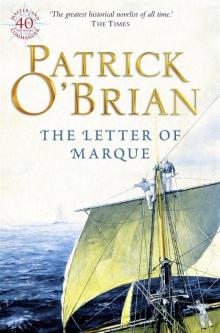 Book 12 - The Letter of Marque
Book 12 - The Letter of Marque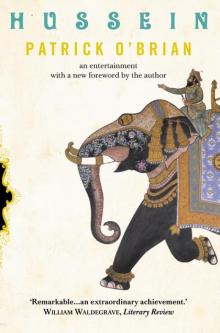 Hussein
Hussein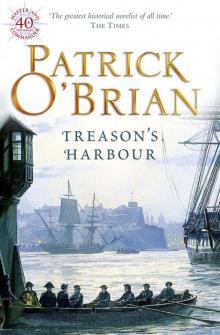 Book 9 - Treason's Harbour
Book 9 - Treason's Harbour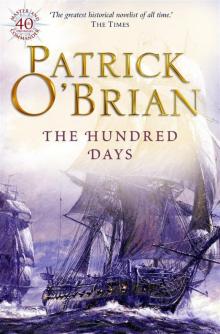 Book 19 - The Hundred Days
Book 19 - The Hundred Days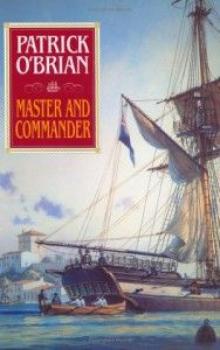 Master & Commander a-1
Master & Commander a-1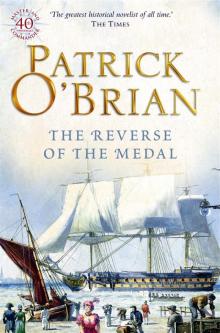 Book 11 - The Reverse Of The Medal
Book 11 - The Reverse Of The Medal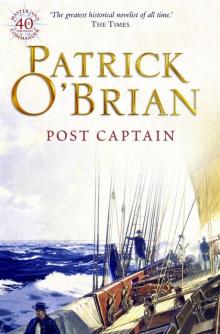 Book 2 - Post Captain
Book 2 - Post Captain The Truelove
The Truelove The Thirteen Gun Salute
The Thirteen Gun Salute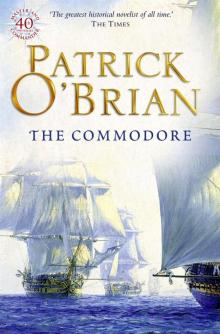 Book 17 - The Commodore
Book 17 - The Commodore The Final, Unfinished Voyage of Jack Aubrey
The Final, Unfinished Voyage of Jack Aubrey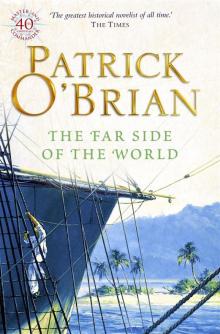 Book 10 - The Far Side Of The World
Book 10 - The Far Side Of The World Book 5 - Desolation Island
Book 5 - Desolation Island Beasts Royal
Beasts Royal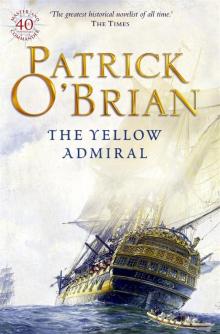 Book 18 - The Yellow Admiral
Book 18 - The Yellow Admiral Book 15 - Clarissa Oakes
Book 15 - Clarissa Oakes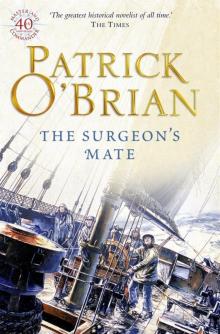 Book 7 - The Surgeon's Mate
Book 7 - The Surgeon's Mate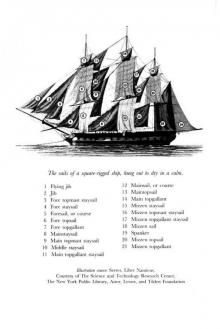 Book 3 - H.M.S. Surprise
Book 3 - H.M.S. Surprise Desolation island
Desolation island Picasso: A Biography
Picasso: A Biography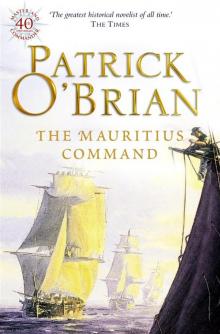 Book 4 - The Mauritius Command
Book 4 - The Mauritius Command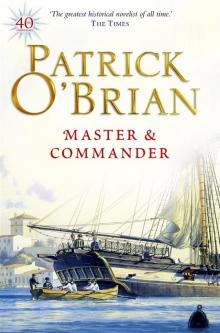 Book 1 - Master & Commander
Book 1 - Master & Commander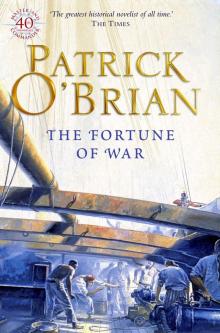 Book 6 - The Fortune Of War
Book 6 - The Fortune Of War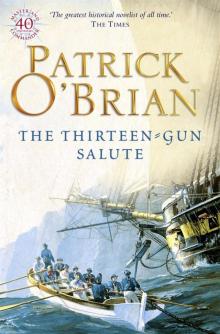 Book 13 - The Thirteen-Gun Salute
Book 13 - The Thirteen-Gun Salute Book 16 - The Wine-Dark Sea
Book 16 - The Wine-Dark Sea